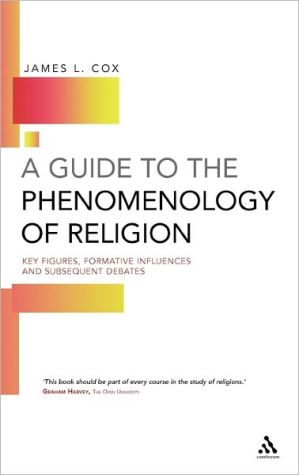

 |

|

Sold Out
Book Categories |
Introduction Part One: Formative Influences Chapter 1: Edmund Husserl and Philosophical Phenomenology From Descartes to Kant The Significance of Hegel Husserl and the Transformation to Idealism Husserl's Phenomenological Method Chapter 2: Theological Influences: The School of Albrecht Ritschl The Theological Climate at the Time of Ritschl Ritschl's Theology of Religions Wilhelm Herrmann and Religion as Communion with God Ernst Troeltsch: A Bridge to the Social Sciences Chapter 3: Reductionism and the Social Sciences Evolutionary Assumptions in the Study of Primitive Religions Projectionist Theories as Explaining Religion Classic Cases in Social Scientific Reductionism: Durkheim and Freud Part Two: Key Phenomenological Schools Chapter 4: Foundational Figures in the Dutch School of Phenomenology Background to the Study of Religions in the Netherlands C P Tiele and P D Chantepie de la Saussaye: Christianity as a World Theology W Brede Kristensen as Advocate of the Believer Gerardus van der Leeuw and the Formation of Phenomenological Typologies C J Bleeker's Universal Structure of Religion Chapter 5: Phenomenology in the United Kingdom The African Connection: Parrinder, McKenzie, Walls and Harold Turner E O James and Ninian Smart: From Comparative Religion to Phenomenology Frank Whaling and the Study of Religions in Edinburgh Chapter 6: North American Phenomenology: Wach, Eliade and W C Smith History of Religions as Diachronic Phenomenology Joachim Wach's Empathetic Sociology Mircea Eliade: Religon as a Longing for the Sacred Wilfred Cantwell Smith's Meaning and End of Religion Part Three: Subsequent Debates Chapter 7: The Reductionist-Religionist Debate Current Polarities The Reductionists: Segal, Wiebe and Strenski The Anti-Religionists: Fitzgerald and Platvoet Chapter 8: Alternatives to Phenomenology Dialogical Approaches: Panikkar, Krieger and Flood Religion as Cultural Studies The Cognitive Science of Religion Hervieu-Leger and Religion as a Chain of Memory Chapter 9: A New Phenomenology of Religion Self-Reflexivity and the Phenomenological Tradition Knowing the 'Other' within Oneself Converting to the 'Other' as Phenomenological Empathy Bibliography Index
Login|Complaints|Blog|Games|Digital Media|Souls|Obituary|Contact Us|FAQ
CAN'T FIND WHAT YOU'RE LOOKING FOR? CLICK HERE!!! X
 You must be logged in to add to WishlistX
 This item is in your Wish ListX
 This item is in your CollectionA Guide to the Phenomenology of Religion: Key Figures, Formative Influences and Subsequent Debates
X
 This Item is in Your InventoryA Guide to the Phenomenology of Religion: Key Figures, Formative Influences and Subsequent Debates
X
 You must be logged in to review the productsX
 X
 X

Add A Guide to the Phenomenology of Religion: Key Figures, Formative Influences and Subsequent Debates, The phenomenological method in the study of religions has provided the linchpin supporting the argument that Religious Studies constitutes an academic discipline in its own right and thus that it is irreducible either to theology or to the social sciences, A Guide to the Phenomenology of Religion: Key Figures, Formative Influences and Subsequent Debates to the inventory that you are selling on WonderClubX
 X

Add A Guide to the Phenomenology of Religion: Key Figures, Formative Influences and Subsequent Debates, The phenomenological method in the study of religions has provided the linchpin supporting the argument that Religious Studies constitutes an academic discipline in its own right and thus that it is irreducible either to theology or to the social sciences, A Guide to the Phenomenology of Religion: Key Figures, Formative Influences and Subsequent Debates to your collection on WonderClub |